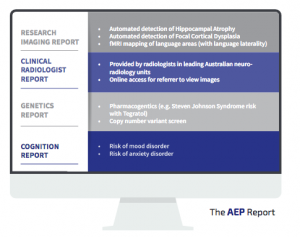Neurologists in Victoria are launching an ambitious program that aims to develop a precision medicine approach for people with epilepsy by applying artificial intelligence to process data from imaging, genetics, cognition and outcomes.
Led by clinicians at the at the Florey Institute of Neuroscience and Mental Health in Melbourne, the Australian Epilepsy Project (AEP) is seeking neurologists as clinical members to help develop a new model of care that will combine machine learning and big data to ‘re-write the book’ on the diagnosis of epilepsy.
According to the invitation being sent to neurologists across Australia, the project will be a platform that aims to answer the questions such as the precise cause of the seizures and which medications or surgery will be most appropriate.
Led by neurologists Professor Graham Jackson and Professor Patrick Kwan, the project is offering members access to “the most advanced and comprehensive epilepsy testing available”, which will deliver a report that includes imaging, genetics and cognition assessment of the patient.
 “If your patients become AEP community members you will receive the AEP report. This comprehensive report will provide clear and accurate results to best support the diagnosis and treatment plan of your patient,” it states.
“If your patients become AEP community members you will receive the AEP report. This comprehensive report will provide clear and accurate results to best support the diagnosis and treatment plan of your patient,” it states.
To become members, patients will need to meet one of three inclusion criteria:
- First unprovoked seizure (definite or probable) with no diagnosis of epilepsy.
- New diagnosis of epilepsy (generalized or focal).
- Pharmacoresitant focal epilepsy.
But the Project’s leaders emphasise that clinician members will not be asked to change their current procedures or workflow.
The project has already secured $1m of Medical Research Future Fund Frontiers Initiative (MRFF) funding, and is starting a pilot study in February 2020 at the Austin Hospital in Melbourne as well as the Translational Research Institute (TRI) and Princess Alexandra Hospital in Brisbane.
The pilot will trial a suite of MRI scans and cognitive tests, trial the recruitment process of participants to the program, evaluate the pathway and timing of delivery, analysis and reporting of the data and evaluate the tolerability of the testing protocol for the patient.
The AEP clinicians say they have a more ambitious target of bidding for a total pool of $250million of MRFF funding.
“This would be the largest single investment in epilepsy in Australia,” they write.
“We are not happy with the uncertainty around seizure and epilepsy diagnosis and treatment – we are on a mission to change this.”